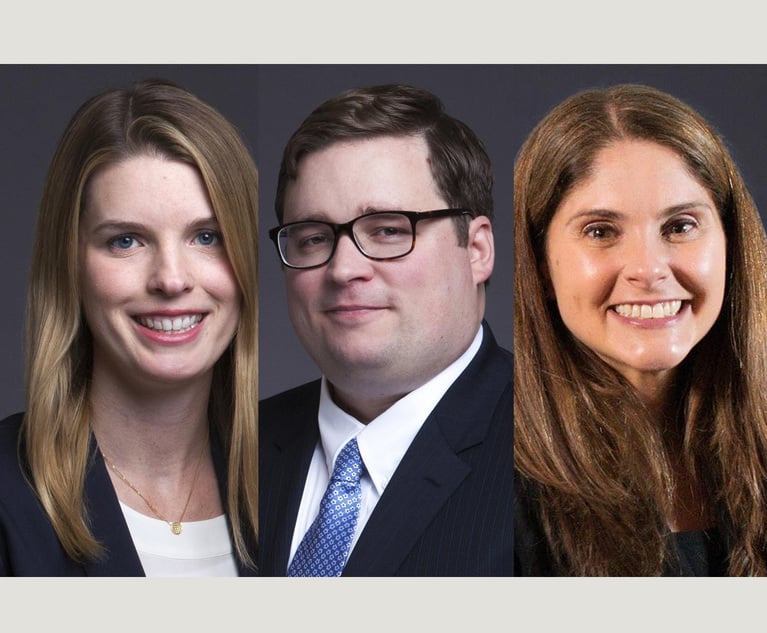Pitt Law Prof, Others Say Fed. Judiciary Needs More Transparency & Reporting Options on Sexual Misconduct
Much of Tuesday's testimony focused on providing alternative channels for reporting sexual misconduct within the judiciary instead of only to the chief judges of the district or circuit courts.
October 30, 2018 at 03:09 PM
5 minute read
 Thurgood Marshall Federal Judiciary Building in Washington, D.C. Credit: Diego M. Radzinschi / NLJ
Thurgood Marshall Federal Judiciary Building in Washington, D.C. Credit: Diego M. Radzinschi / NLJ
A ban on consensual romantic relationships between judges and their employees, and continued investigation and public report of judges accused of sexual misconduct even if they retire or resign were among proposals offered Tuesday during a hearing on the federal judiciary's efforts to deal with workplace misconduct.
During the daylong hearing, 10 members of the Judicial Conference committees on Codes of Conduct and Judicial Conduct and Disability heard suggestions on the committees' proposed amendments to the codes and rules from federal judges, former law clerks, law students and legal ethics and federal court scholars, among others.
Much of the testimony focused on providing alternative channels for reporting sexual misconduct instead of only to the chief judges of the district or circuit courts, and increased transparency in the investigation and resolution of complaints.
“Judges shouldn't make [confidentiality] promises they can't keep,” said Charles Geyh of Indiana University Maurer School of Law. “There needs to be a safe space where complainants can talk to someone outside of the direct chain of command. They might not know whether to file a complaint or to proceed.”
To that end, Arthur Hellman of the University of Pittsburgh School of Law told the committees, “Encourage circuits to establish web portals to enable employees to let the chief judge know of possible misconduct without filing a complaint. The chief judge has to be out there very publicly, telling the world he or she wants to hear what's wrong and will protect against retaliation, and employees should find a similar statement making the same commitment on that electronic site or on the judiciary intranet landing page.”
A group of seven Yale law students also said the proposed reporting process was “too rigid,” and suggested that alternatives could include submitting complaints to three-judge panels or to the most senior judge of a circuit, and to allow transfer of a complaint to another circuit at the request of the accused judge or the complainant.
Senior Judge Anthony Scirica of the U.S. Court of Appeals for the Third Circuit, chair of the committee on Judicial Conduct and Disability, said the committee was inclined to look favorably on the proposal to create an Office of Judicial Integrity within the Administrative Office of the U.S. Courts to receive and investigate misconduct complaints.
Yale's Rita Gilles also urged the committees to include law schools in the reporting requirements, as givers and receivers of information about sexual misconduct.
Jaime Santos of Goodwin Procter and Kendall Turner of O'Melveny & Myers, co-founders of Law Clerks for Workplace Accountability, raised concerns with judges being both investigators and adjudicators of complaints. “At a minimum, disinterested individuals outside the circuit should investigate and resolve complaints,” Santos said.
Judge Ralph Erickson of the Eighth Circuit, chair of the Codes of Conduct committee, asked Santos about the present rule that once an accused judge retires or resigns, nothing more is done about a complaint. Santos and Turner disagreed with that policy.
“Even where there is a resignation, it's important for the public trust and victims, for there to be an investigation into what happened,” Turner said. Santos added, “Many judges who retire may be interested in coming back into public life, for example, writing op eds or teaching. The lack of investigation makes it possible for that to happen without anyone knowing the full circumstances. I do think there should be a report after something like that happens.”
Hellman urged greater disclosure and transparency when allegations become the subject of public knowledge. “If you have such a report, the chief judge should be required to identify a complaint; interim orders should be made public, and the final order should be isolated from the routine orders that are published today. At a minimum, post orders of general public interest on a separate page or under separate heading or have an index of non-routine orders on the judiciary website.”
And Renee Newman Knake of the University of Houston Law Center said the committees also should focus on how to create a culture where misconduct does not occur. “A separate provision banning even consensual romantic relationships between judges and clerks would help curtail sexual overtures that may feel consensual on the part of instigator but harassing to the other person,” she said.
The two committees' proposed amendments are in response to recommendations made in a June report by the Federal Judiciary Workplace Conduct Working Group. That working group was established at the direction of Chief Justice John Roberts Jr. last December. The impetus for the group was the widely publicized sexual harassment allegations against former Judge Alex Kozinski of the U.S. Court of Appeals for the Ninth Circuit. Kozinski resigned in December amid those allegations of harassment against female law clerks.
Roberts directed the working group to consider whether changes were needed to the Judiciary's codes of conduct; its guidance to employees on issues of confidentiality and reporting of instances of misconduct; its educational programs; and its rules for investigating and processing misconduct complaints.
The two Judicial Conference committees are accepting comments on the proposed amendments until Nov. 13.
Read more:
Will Chief Justice Roberts Take His Own Advice When It Comes to LGBTQ Employees?
The #MeToo Backlash Is Building
Federal Judicial Misconduct Rules Could Get a Significant Makeover
This content has been archived. It is available through our partners, LexisNexis® and Bloomberg Law.
To view this content, please continue to their sites.
Not a Lexis Subscriber?
Subscribe Now
Not a Bloomberg Law Subscriber?
Subscribe Now
NOT FOR REPRINT
© 2025 ALM Global, LLC, All Rights Reserved. Request academic re-use from www.copyright.com. All other uses, submit a request to [email protected]. For more information visit Asset & Logo Licensing.
You Might Like
View All
Lawsuit Against Major Food Brands Could Be Sign of Emerging Litigation Over Processed Foods
3 minute read

People in the News—Jan. 23, 2025—Marshall Dennehey, Duane Morris, Hangley Aronchick
3 minute read
Plaintiff Argues Jury's $22M Punitive Damages Finding Undermines J&J's Talc Trial Win
4 minute readTrending Stories
- 1We the People?
- 2New York-Based Skadden Team Joins White & Case Group in Mexico City for Citigroup Demerger
- 3No Two Wildfires Alike: Lawyers Take Different Legal Strategies in California
- 4Poop-Themed Dog Toy OK as Parody, but Still Tarnished Jack Daniel’s Brand, Court Says
- 5Meet the New President of NY's Association of Trial Court Jurists
Who Got The Work
J. Brugh Lower of Gibbons has entered an appearance for industrial equipment supplier Devco Corporation in a pending trademark infringement lawsuit. The suit, accusing the defendant of selling knock-off Graco products, was filed Dec. 18 in New Jersey District Court by Rivkin Radler on behalf of Graco Inc. and Graco Minnesota. The case, assigned to U.S. District Judge Zahid N. Quraishi, is 3:24-cv-11294, Graco Inc. et al v. Devco Corporation.
Who Got The Work
Rebecca Maller-Stein and Kent A. Yalowitz of Arnold & Porter Kaye Scholer have entered their appearances for Hanaco Venture Capital and its executives, Lior Prosor and David Frankel, in a pending securities lawsuit. The action, filed on Dec. 24 in New York Southern District Court by Zell, Aron & Co. on behalf of Goldeneye Advisors, accuses the defendants of negligently and fraudulently managing the plaintiff's $1 million investment. The case, assigned to U.S. District Judge Vernon S. Broderick, is 1:24-cv-09918, Goldeneye Advisors, LLC v. Hanaco Venture Capital, Ltd. et al.
Who Got The Work
Attorneys from A&O Shearman has stepped in as defense counsel for Toronto-Dominion Bank and other defendants in a pending securities class action. The suit, filed Dec. 11 in New York Southern District Court by Bleichmar Fonti & Auld, accuses the defendants of concealing the bank's 'pervasive' deficiencies in regards to its compliance with the Bank Secrecy Act and the quality of its anti-money laundering controls. The case, assigned to U.S. District Judge Arun Subramanian, is 1:24-cv-09445, Gonzalez v. The Toronto-Dominion Bank et al.
Who Got The Work
Crown Castle International, a Pennsylvania company providing shared communications infrastructure, has turned to Luke D. Wolf of Gordon Rees Scully Mansukhani to fend off a pending breach-of-contract lawsuit. The court action, filed Nov. 25 in Michigan Eastern District Court by Hooper Hathaway PC on behalf of The Town Residences LLC, accuses Crown Castle of failing to transfer approximately $30,000 in utility payments from T-Mobile in breach of a roof-top lease and assignment agreement. The case, assigned to U.S. District Judge Susan K. Declercq, is 2:24-cv-13131, The Town Residences LLC v. T-Mobile US, Inc. et al.
Who Got The Work
Wilfred P. Coronato and Daniel M. Schwartz of McCarter & English have stepped in as defense counsel to Electrolux Home Products Inc. in a pending product liability lawsuit. The court action, filed Nov. 26 in New York Eastern District Court by Poulos Lopiccolo PC and Nagel Rice LLP on behalf of David Stern, alleges that the defendant's refrigerators’ drawers and shelving repeatedly break and fall apart within months after purchase. The case, assigned to U.S. District Judge Joan M. Azrack, is 2:24-cv-08204, Stern v. Electrolux Home Products, Inc.
Featured Firms
Law Offices of Gary Martin Hays & Associates, P.C.
(470) 294-1674
Law Offices of Mark E. Salomone
(857) 444-6468
Smith & Hassler
(713) 739-1250





